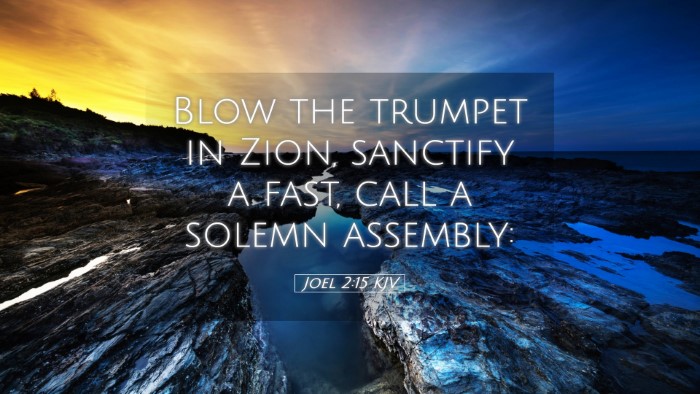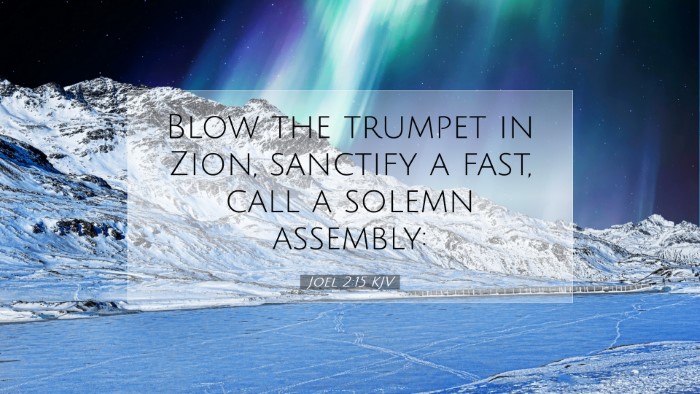Commentary on Joel 2:15
The verse Joel 2:15 states, "Blow the trumpet in Zion, sanctify a fast, call a solemn assembly." This passage serves as a call to repentance and an urgent summons for the people of God to gather to seek His mercy during times of crisis.
Context and Setting
The Book of Joel is one of the minor prophets in the Old Testament, addressing a period of calamity, potentially due to a locust plague and a subsequent drought. The events described in Joel have both immediate local implications and eschatological significance, making the themes highly relevant for congregational settings today.
Exegesis of Joel 2:15
In diving into Joel 2:15, we uncover several key elements:
- Blow the trumpet in Zion: The trumpet (or shofar) is a significant biblical symbol often used to alert the people to a call of action or to herald important announcements. In this context, it signals the urgency of the moment—calling upon the people to be aware of their spiritual state.
- Sanctify a fast: Fasting is a profound act of humility and conscientious self-denial before God. The call to 'sanctify a fast' emphasizes the need for believers to prepare their hearts, marking this time as sacred and set apart for seeking God earnestly.
- Call a solemn assembly: The assembly highlights communal repentance and unity in seeking restoration from God. This public gathering signifies a collective acknowledgment of sin and desperation, embodying the heart of communal worship and supplication.
Theological Insights
From the insights of Matthew Henry, Albert Barnes, and Adam Clarke, we can glean several important theological implications:
- The significance of collective repentance: According to Matthew Henry, the act of coming together to fast and pray is essential, especially in a national crisis. It reflects a recognition of God’s sovereignty and the need for His grace among people.
- The urgency of response: Barnes elaborates on the importance of a prompt response to the trumpet’s call. Delays in spiritual action can hinder the restoration process God desires for His people.
- The need for readiness: Adam Clarke stresses the importance of being spiritually prepared, highlighting that the act of fasting and assembling should be approached with sincerity and profound reverence for God.
Practical Applications
For pastors and church leaders, Joel 2:15 serves as a guide for leading congregations in times of spiritual or physical crisis:
- Encouragement to preach urgency: Preachers might draw from this text to encourage urgent calls to prayer and repentance, especially during critical moments in the life of the church or community.
- Modeling corporate worship: Instituting regular times for fasting and corporate prayer can foster a deeper communal spiritual life. Churches can create solemn assemblies to come together during trying times, invoking a strong sense of unity and shared purpose.
- Fostering hearts of repentance: Pastors may use this verse to cultivate a culture of humility within their congregations, encouraging members to acknowledge sins collectively and seek God's forgiveness earnestly.
Conclusion
In conclusion, Joel 2:15 stands as a powerful reminder of the importance of calling upon God in times of need, emphasizing communal action through repentance and prayer. The insights from public domain commentaries underscore that this call is relevant not just in the context of ancient Israel but also in contemporary worship practices and individual spiritual lives. By understanding and applying these principles, pastors, students, and theologians alike can be equipped to respond faithfully to the divine call that echoes through the ages.


